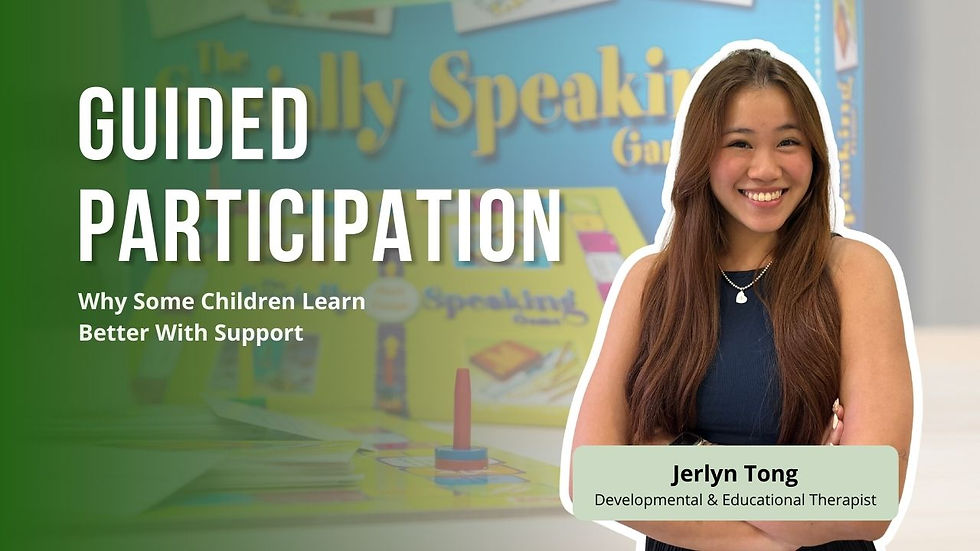How to Parent So Children Will Listen and Remember?
- Total Communication

- Sep 2, 2021
- 4 min read
Updated: Apr 7, 2022
by Zhi Ying Tan (Educational Psychologist)

Why doesn’t my child listen? This is probably an age-old question that many parents must have wondered at one point in their life. To answer this question, parents need to know a little about the brain and how it works.
The lower brain at the back of our head is generally involved in essential functions such as breathing, heart-rate regulation, balance and movement, and sleep. This part of the brain is the first to develop and mature in human because it ensures survival.
Several brain structures located inside the middle of the brain form the limbic system. These structures are generally involved in emotional behaviour, memory, sensory perception, regulation of motor functions among other functions. The limbic system influences the endocrine (regulates hormonal flow and secretion) and autonomic nervous system (regulates blood pressure, heart rate, fight or flight response etc). Together, the limbic, endocrine, and autonomic nervous systems affect emotional state and responses (fight, flight or freeze).

The development of the higher brain, where the frontal lobe resides at the front of your head, allows for higher order mental functions such as thinking, problem-solving, memory, speech, language, planning and organising, attention, judgement, and decision-making (Tranel, Cooper, & Rodnitzky, 2003). The frontal lobe is the last part of the brain to mature which continues to develop even in the twenties.
So, how does knowing the brain structures helps in our understanding of parenting? First, when a child is highly dysregulated, acting out, or being physically aggressive, its frontal lobe is “offline”. The child is in the survival state where the lower brain dominates. Reasoning with a child or asking the “why” questions is unproductive because nothing is processed meaningfully.
Second, expecting the child to execute higher order mental functions and self-regulate when their frontal lobe is not developed is unrealistic. Children need to “borrow” the adult’s frontal lobe to practice and learn these functions. Parents need to model the thinking process for the child in order to help them learn these skills to do it independently.
Also, emotional self-regulation skill is taught by first co-regulating with the child. Essentially, if a parent is unable to self-regulate when dysregulated, the child has no one to rely on to learn through vicarious or experiential learning. However, it is acknowledged that some parents have complex background such as trauma which deprived them of opportunities to learn these skills in childhood and are struggling with their own set of issues. For these parents, it is recommended that they seek help from a psychologist to work on the issues that may be holding them back from providing the care their children need.

Third, safety and a sense of security are needed for the brain to function optimally for the child to feel safe enough to explore and learn. Therefore, threatening to punish, hit, or even abandon the child when they are dysregulated should be avoided as useful coping skills are not imparted. Instead, stay calm and help the child to regain composure to bring the frontal lobe “online”.
Deep breathing is a simple but effective co-regulation strategy to use with children. It brings down the heart rate, breathing rate, blood pressure, muscle tension and such so the higher brain can be accessed again. Breathe deeply with your child and reduce verbal commands. You may choose to have some physical contact with the child such as holding his hands while deep breathing.
Often, the child moves into the emotional state where the limbic system dominates before the frontal lobe comes “online”. When in this state, expect verbal aggression such as “I hate you!” and name calling. At times like this, continue to breathe deeply with the child and be present in the moment with him to send the message that he is safe with you.

Lastly, when the child has regained composure and you sense that the frontal lobe is “online” again, help the child to label the emotions (angry, sad, disappointed, frustrated etc) he has experienced and express his wants/needs with words. It is important to validate and acknowledge his feelings and responses because it helps him to know that you get it and you can help him manage it.
For example, try saying “I think you are angry and I can see that it is difficult for you.” Once the child is calm, take him through the problem-solving process together and explore how this need/want can be expressed more appropriately in the future. It may be helpful to start explaining and reasoning with the child at this stage as their frontal lobe can once again process this information and store it in their memory.
Most importantly, be prepared to repeat this process again and again until the child develops the skills and brain maturity to behave appropriately and independently. It is more important to journey it together and build the parent-child connection. Parenting is a lifelong journey where both the parent and child grows and learn together. Remember, cooperation always comes after connection.
*The pronouns “he” and “him” were used throughout for convenience’s sake and not intended to be discriminatory in nature.
If you are interested in such articles, check out our website often as we will be posting regularly.
References
Tranel, D., Cooper, G., & Rodnitzky, R. L. (2003). Higher Brain Functions. Neuroscience in Medicine, 621-639. Retrieved from https://link.springer.com/chapter/10.1007%2F978-1-59259-371-2_29





Comments